May 22, 2025 | 04:24 GMT +7
May 22, 2025 | 04:24 GMT +7
Hotline: 0913.378.918
May 22, 2025 | 04:24 GMT +7
Hotline: 0913.378.918
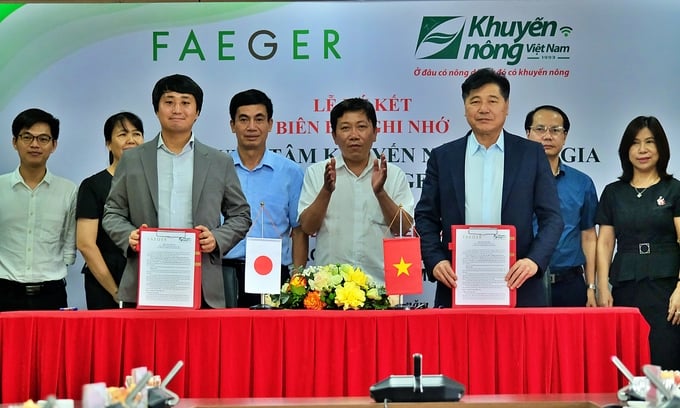
The National Agricultural Extension Center and Faeger Co., Ltd. signed a memorandum of cooperation. Photo: Bao Thang.
Recently, the National Agricultural Extension Center signed a memorandum of understanding with Faeger Co., Ltd. to strengthen cooperation in promoting greenhouse gas emission reduction agricultural projects in Vietnam and to assist farmers in producing sustainable agriculture with lower emissions.
Mr. Takai Yusuke, Executive Director of Faeger Co., Ltd., claimed that the company has considerable experience and solutions for creating emission-reducing agricultural practices in Japan. As a result, the company's assistance in promoting greenhouse gas emission reduction agricultural projects is consistent with Vietnam's aim of decreasing methane emissions by 35% as per the 2022 modifications to the nationally determined contributions under the Paris Agreement adopted at COP 21 in 2015.
According to projections, Vietnam will require approximately USD14 billion in support to accomplish the plan between now and 2030. Based on this, Faeger Co., Ltd. will carry out a plan. Specifically, in 2024, the company will perform small-scale verification trials and prepare for pilot projects, as well as sign cooperation agreements with the Departments of Agriculture and Rural Development in provinces participating in the 1 million hectares of high-quality rice initiative.
In 2025, the company plans to begin a trial project with more than 50 houses across an area of around 500 hectares. Furthermore, it will register projects in provinces and cities where verification trials or pilot initiatives have been completed.
Faeger's project will begin in 2026 on an estimated scale of 20,000 to 30,000 hectares and will bring financial returns to farmers who participate in it. If everything proceeds as planned, the project area will grow to one million hectares by 2030.
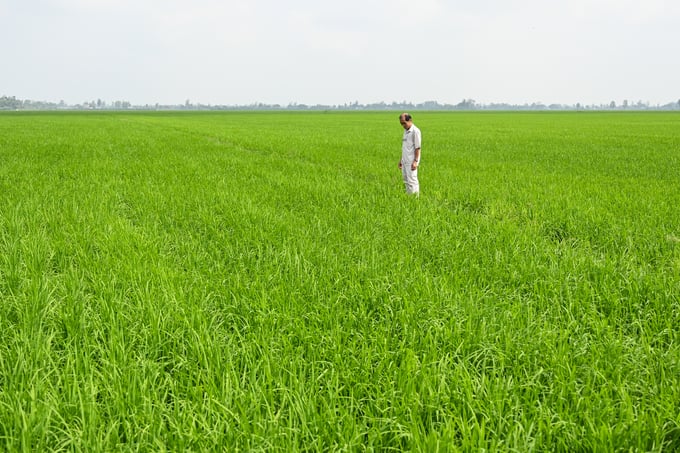
Rice cultivation that reduces emissions will be a sustainable direction for rice production. Photo: NNVN.
To benefit from the project, people of the 1 million hectares of high-quality rice land must minimize emissions through AWD (Alternate Wetting and Drying) irrigation methods. The Tokyo-based company will assess and quantify the reductions in emissions achieved through AWD. This will facilitate the conversion and evaluation of emission-reduction efforts into carbon credits recognized by international certifying agencies.
Additionally, the corporation will create policies to assist businesses in reinvesting revenues for farmers involved in the project. Faeger has previously implemented the Joint Crediting Mechanism (JCM) in various countries, including Vietnam.
This method, offered by some Japanese organizations to developing nations, seeks to promote the transfer and dissemination of low-carbon emission technology for green growth in the host country while simultaneously helping Japan's international commitments to reduce greenhouse gas emissions.
"We are devoted to delivering comprehensive knowledge and skills in sustainable agriculture for the project area. Furthermore, Faeger will be in charge of integrating financing sources from the JCM to help farmers promote green transitions, ensuring financial resources for project implementation and emission reduction measures," Mr. Yusuke explained.
According to Faeger leaders, the 1 million hectares of high-quality rice initiative, which has been executed in 12 provinces and towns across the Mekong Delta area, is in line with Vietnam's green transition criteria for rice producers.
Mr. Le Quoc Thanh, Director of the National Agricultural Extension Center, stated that the government-mandated 1 million hectares of high-quality rice program, which the Ministry of Agriculture and Rural Development is in charge of, is a fresh issue not only in Vietnam but also around the world.
In addition to quality, achieving green growth needs through the production process (in this case, rice) is an important part of the project. Mr. Thanh believes that cooperating with partners from wealthy countries, such as Faeger, will shorten the research process.
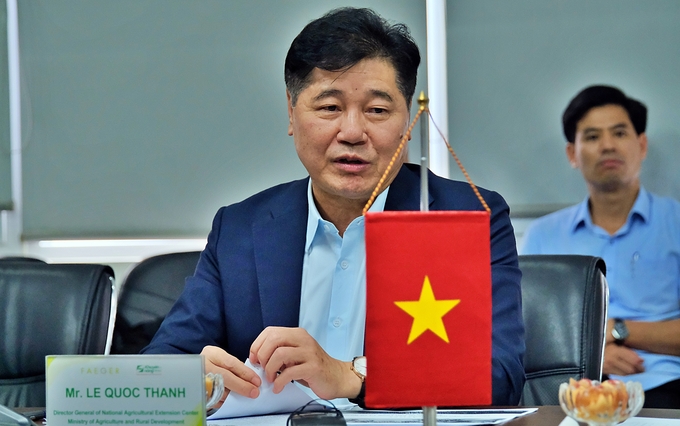
According to Mr. Le Quoc Thanh, technology transfer through the agricultural extension system will reach farmers quickly and promptly. Photo: Bao Thang.
Furthermore, Vietnam will have more opportunity to communicate with seasoned professionals and cutting-edge emission reduction technologies.
With over 30,000 agricultural extension personnel and thousands of grassroots agricultural extension organizations around the country, the agricultural extension system is regarded as the most accessible organization to farmers. As a result, agricultural extension will deliver technology and technological developments to farmers in a timely and effective manner.
In addition to the desire of both sides to collaborate in the long run, Director Le Quoc Thanh asked Faeger to propose solutions that would allow Vietnam to precisely measure the level of pollution reductions. This would allow for precise estimations of environmental protection levels, resulting in greater income for farmers in the 1 million hectares of high-quality rice project region.
Drawing on its experience, the National Agricultural Extension Center is committed to participating in the development of real-world sustainable farming models that suit both parties' common objectives.
Mr. Nguyen Do Anh Tuan, Director of the International Cooperation Department (Ministry of Agriculture and Rural Development), indicated that Vietnam still has tremendous potential for reducing emissions from diverse crops. In addition to rice, sustainable farming can be used to grow fruit trees, coffee, tea, and other crops.
Translated by Linh Linh
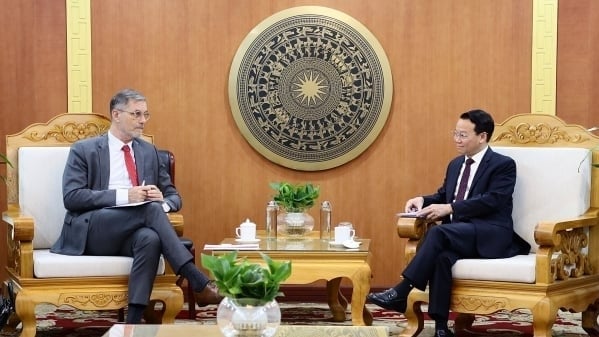
(VAN) On May 21, Minister of Agriculture and Environment Do Duc Duy worked with Mr. Olivier Brochet, Ambassador Extraordinary and Plenipotentiary of the French Republic to Vietnam.
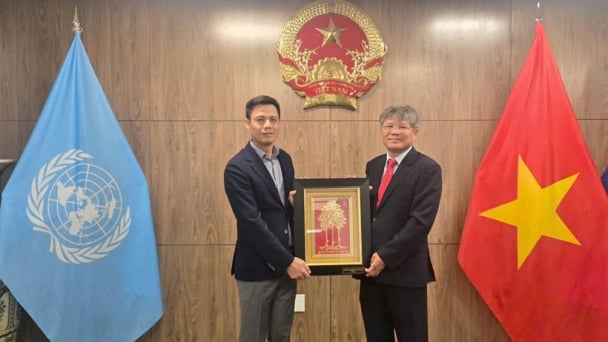
(VAN) VRG recently conducted a visit and working trip to the United States to demonstrate its efforts in redefining the role of rubber enterprises in the global value chain.

(VAN) In 2024, over 295 million people across 53 countries and territories faced acute hunger—an increase of almost 14 million people compared to 2023, while the number of people facing catastrophic levels of hunger reached a record high.

(VAN) World Environment Day 2025 (June 5) carries the theme 'Beat Plastic Pollution' continuing to emphasize the global urgency of addressing the plastic waste crisis.

(VAN) This was the assessment shared by experts at the workshop titled 'Assessing the Role and Potential of Low-Emission Rice Production Systems in Vietnam,' held on the morning of May 19.

(VAN) Cai Rong Port is the fisheries control center of Quang Ninh, helping to monitor fishing vessels, combat IUU fishing, and remove the EC's 'yellow card'.

(VAN) The German Agricultural Society (DLG) explores the possibility of establishing a mechanization service center in Vietnam’s Mekong Delta to support farmers in accessing and utilizing advanced machinery.